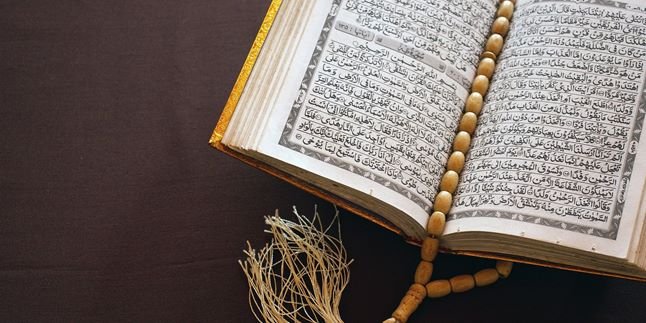Kapanlagi.com - Good morals certainly bring many benefits to a person. In Islam, the explanation of the importance of having good morals is stated in the Quran. The meaning of akhlak in Islam is closely related to a person's behavior.
Our behavior in daily life can reflect the morals we have. Because the meaning of akhlak is already inherent in a person, including their nature and character.
That is why you are certainly familiar with the phrase that a person's personality is a reflection of their morals. In Islam, there are two types of akhlak, namely praiseworthy and blameworthy.
To know the explanation of the meaning of akhlak in Islam along with its types and virtues, here is the review. Let's check it out below about the meaning of akhlak in Islam that has been summarized by kapanlagi.com from various sources.
1. The Meaning of Akhlak in Islam

(credit: unsplash.com)
Politeness in social life is an example of noble character that someone possesses. In Islam, known as akhlakul karimah, which means praiseworthy character that every Muslim should have. Moreover, the recommendation to have akhlakul karimah has been explained in several verses of the Quran and Hadith. But do you already know the meaning of character in Islam?
Before discussing the meaning of character in Islam, let's first look at the explanation of the meaning of character in the Indonesian Dictionary (KBBI). Referring to KBBI, the meaning of character is manners or behavior. Meanwhile, in terms of language, the meaning of character comes from Arabic, namely khuluk. The meaning of character from that word has the meaning of behavior, conduct, and nature.
If summarized, the above understanding of character explains someone's behavior in daily life. Where morality is inherent in a person that drives them to act or do something without coercion. In other words, the meaning of morality arises naturally within oneself and is done continuously or repeatedly.
In addition, religion is also a source of a person's morality. In Islam, the meaning of morality can be said to encourage the emergence of actions and relationships between Allah, fellow human beings, and the universe.
According to the great figure in Islam, Imam Al-Ghazali explained the understanding of morality as one of the qualities that is inherent in the human soul. This quality can trigger actions that are easily done without further consideration. It can also be said that a person's morality is their inherent nature or character. That is the understanding or meaning of morality in Islam that you need to know.
2. Various Types of Akhlak in Islam and Their Differences

(credit: unsplash.com)
The meaning of akhlak is closely related to a person's behavior in daily life. It is not only their behavior towards other human beings, but also towards God and all creatures on earth. In Islam, there are several important types of akhlak that you need to know. That is why below is an explanation of the various types of akhlak in Islam along with their differences.
1. Akhlak Mahmudah
The meaning of akhlak mahmudah is praiseworthy behavior that a person possesses. It is considered praiseworthy, which is why it is very important for a Muslim to have mahmudah akhlak in daily life. In daily life practice, mahmudah akhlak can be categorized into several categories such as honesty, good behavior, shyness, humility, generosity, and patience.
2. Akhlak Mazmumah
In contrast to the meaning of akhlak mahmudah, akhlak mazmumah means reprehensible or bad behavior. As it is considered reprehensible behavior, it is only natural for a Muslim to avoid it. Meanwhile, some categories of mazmumah akhlak are gossiping, stealing, envy and jealousy, injustice, and others that harm others.
Those are the various types of akhlak in Islam that you need to know. This way, it can make it easier for you to distinguish between praiseworthy and reprehensible behavior.
3. The Evidence of Morality in Islam

(credit: unsplash.com)
As mentioned in the previous review, the meaning of morality in Islam has been explained in several verses of the Quran. Evidence about the importance of having good morality in Islam can be used as motivation to maintain and have noble morality. Now, here are some evidence about morality in Islam.
1. Quranic Evidence, Surah Shad Verse 46:
"Indeed, We have purified them with high morality - reminding (people) of the Hereafter."
The above verse explains about the high morality possessed by the Prophets and Messengers, which is to always maintain noble morality and stay away from despicable acts. In addition, it serves as guidance and an example for humans to obey Allah's commands.
2. Quranic Evidence, Surah Ali-Imran Verse 134:
"(i.e.) those who spend (in the cause of Allah) during ease and hardship and who restrain anger and who pardon the people - and Allah loves the doers of good."
The above verse explains about the meaning of praiseworthy morality, which is to maintain politeness and restrain anger. So it can be included as a praiseworthy act that is liked by Allah SWT.
3. Quranic evidence in Surah Al-Isra verse 37:
"And do not walk on this earth with arrogance, for you will never be able to penetrate the earth nor reach the height of the mountains."
The above verse explains the importance of good manners, namely avoiding arrogant traits and attitudes. That is why it is important to have humble manners.
4. Quranic evidence in Surah At-Taubah verse 119:
"O you who believe, fear Allah and be with those who are truthful."
The verse explains the importance of honesty. So it can be used as motivation to avoid lying and falsehood.
4. The Virtue of Having Noble Morals

(credit: unsplash.com)
After knowing the explanation of the meaning of morality in Islam, there are various virtues that Muslims can obtain if they apply noble morals. Among the virtues of having noble morals that you can learn are as follows.
- Becoming a good deed on the Day of Judgment can be one of the things that weigh heavily on the scales on the Last Day.
- Loved more by the Prophet Muhammad SAW.
- Elevated status and position in the hereafter.
- Guaranteed to have a house in heaven.
5. Examples of Noble Character

(credit: unsplash.com)
Meanwhile, there are also several examples of noble character that are very easy to apply in daily life. Some of these examples of noble character can be seen below.
- Always polite to others, especially to older people.
- Being humble and not arrogant.
- Willing to help others in need.
- Speaking kindly and politely.
- Not gossiping or spreading others' flaws.
KLovers, that's an explanation of the meaning of character in Islam. Hopefully, it can be used as a reference and take the best wisdom from the meaning of character above.
(kpl/gen/nlw)
Disclaimer: This translation from Bahasa Indonesia to English has been generated by Artificial Intelligence.

















